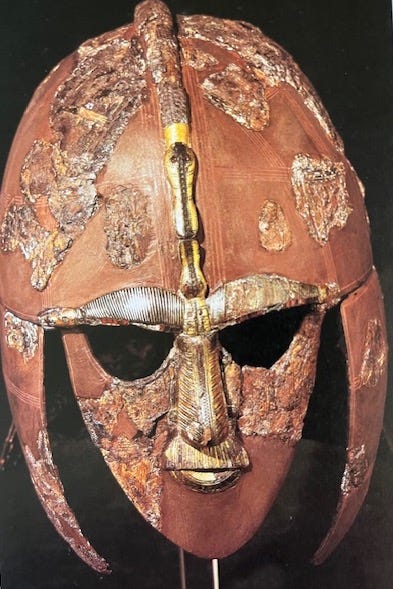By DAVID MYTON
One of JRR Tolkien’s greatest achievements was to make the world of Middle Earth completely acceptable to the reader - despite its cast of extraordinary characters, creatures and locations. Whatever happens, that’s just the way it is in The Lord Of The Rings.
In a recent post (‘I’ve got rambling on my mind’) I looked at the role of walking – by Frodo and Sam; Merry and Pippin; Legolas, Gimli and Aragorn, among others - in helping to make Middle Earth believable.
Before the internal combustion engine, before the horse, people walked to wherever it was they needed to be … that’s just the way it was.
Another Tolkien technique in enhancing believability involved delving into Anglo-Saxon poetry to find suitable words, sentiments and behaviours that would underscore the authenticity of key characters in pivotal scenes.
So in The Two Towers, Chapter VI – The King Of The Golden Hall – Gandalf, Aragorn, Legolas and Gimli are riding to Meduseld to talk to Theoden, King of the Mark of Rohan.
On the way, Aragorn chants some verses that are “laden with the sadness of Mortal Men”:
“Where now the horse and the rider? Where is the horn that was blowing?Where is the helm and the hauberk, and the bright hair flowing?
Where is the hand on the harpstring, and the red fire glowing …”These lines are derived from a much longer Old English poem called The Wanderer, from which is an extract below:
He who deeply considers, with wise thoughts,
this foundation and this dark life,
old in spirit, often remembers
so many ancient slaughters, and says these words:
'Where has the horse gone? where is the rider? where is the giver of gold?
Where are the seats of the feast? where are the joys of the hall?
O the bright cup! O the brave warrior!
O the glory of princes! How the time passed away,
slipped into nightfall as if it had never been!
(Extract from Poetry Foundation - https://www.poetryfoundation.org/poems/159113/the-wanderer-636eba2a8c60b)
These were real sentiments expressed by real people, who existed in a long-gone time.
Tolkien arranged Legolas’s words to suit the context of his story, but he did not simply make them up.
His genius was to use them as bedrock to support the characters of Rohan, a foundation based on a long-ago reality, but real just the same.
Thus Middle Earth maintains and enhances its believability because it is so much more than fantasy – it is supported by real history.
A little later the companions arrive at Theoden’s hall, where they are stopped by “many men in bright mail”.
Eventually they are allowed to proceed and are told: “Theoden gives you leave to enter; but any weapon that you bear, be it only a staff, you must leave on the threshold. The doorwardens will keep them.”
There then follows a rigmarole in which Gandalf, Legolas, Gimli and Aragorn, with much reluctance, hand over their weapons to Hama the Doorwarden.
Gandalf is also asked to hand over his staff, but he objects saying, in part: “Foolishness! Prudence is one thing, but discourtesy is another. I am old …”
Hama replies that a staff in the hand of a wizard may be more than a prop for age … “Yet in doubt a man of worth will trust to his own wisdom. I believe you are friends and folk worthy of honour …” And so the companions enter Theoden’s Golden Hall.
This entire exchange is based on the Old English epic poem Beowulf, of which Tolkien was an expert.
Beowulf and his crew are challenged by a coastguard on arrival in Denmark, and then endure a procedure of challenges and checks by guards and doorwardens.
The point is, although Beowulf is fantastical, it nevertheless reflects the underlying reality of the world in which it was created.
Someone, sometime, will have been stopped at the entrance to a great hall and been asked to hand over his weapon. Verbal exchanges will have followed. Decisions will have been made.
As Tolkien expert Tom Shippey writes, the interchanges with the guards do more than show that Tolkien was copying Beowulf.
“They make a point about the Riders’ sense of honour, and of proper behaviour, in a sense wider than mere formulas of greeting … As often Tolkien’s imaginative re-creation of the past adds to it an unusual emotional depth.”
Tolkien’s epic work of fantasy is so readily believable because it rests on a foundation of reality.
References
J.R.R. Tolkien, The Lord Of The Rings, HarperCollins, 2004
Beowulf (trans. by Francis B. Gummere) - https://www.poetryfoundation.org/poems/50114/beowulf-modern-english-translation
The Wanderer: Old English Poetry Project - https://oldenglishpoetry.camden.rutgers.edu/the-wanderer/
T.A. Shippey, J.R.R. Tolkien, Author Of The Century, HarperCollins, London, 2000.
Robert Lacey and Danny Danziger, The Year 1000: What Life Was Like At The Turn Of The First Millennium, Abacus, 2000.





A delightful read, David! I am so glad I stumbled upon your work.
Thank you, very kind of you to say so. Much appreciated - best regards David M